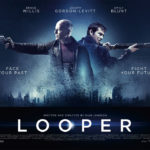Review (Blu-ray): LOOPER (2012)

LOOPER
A Sony/TriStar Pictures Release
Dir-scr: Rian Johnson
Throughout the history of storytelling, writers and other artists have toyed with a Big Impossible Idea: that of attaining the power imbued through an ability to move outside the parameters of the flow of time. It’s irresistible for one reason alone—the individual who has the ability to move backward through time, even in only the one direction and for one chance, can change his own future.
As a storytelling and thematic device, however, time travel’s become a ridiculously familiar trope: the Star Trek universe alone, in which the ‘warping’ of space and the traversing of light-years in seemingly mere minutes is as routine an activity as zipping over to the corner store for a sixer and pack of gum, has turned to time travel innumerable times on both small and large screen. By the time we get to a pop culture phenomenon like the hit Back to the Future series, which represents a sub-genre—the time-travel comedy—H. G. Wells and his Morlocks begin to seem terribly dusty and long-ago indeed.
I’m no stranger to the seductive possibilities myself: an early unpublished short story dealt with a pair of college computer geeks using their professor’s newly-invented time machine to go back and beat Bill Gates to the punch in writing DOS code, and came with a shock, twist ending—young short story writers always think you need a shock ending—of the sort that goes part and parcel with the time-travel genre: think the end of Planet of the Apes, or of Back to the Future Part 2, where at its cliffhanger conclusion Marty McFly finds out that this time Doc Brown’s been sent back not to 1955, but 1885. Sudden! Shock!
Are we fascinated by the idea of time travel because we’re stuck in the now? And don’t have any control over the forward-flowing arrow of time?
In Looper, Rian Johnson, a young filmmaker here making his major studio debut, has concocted another in this lengthening line of time-travel scenarios. Starring Joseph Gordon-Levitt (in not-entirely-convincing prosthetic and CGI makeup) and Bruce Willis as the same character at ages thirty years apart. As for the mechanics of the plot, let’s see if I can get this right: In the future time travel’s been invented, sure, but because the practice is so dangerous it has been outlawed. Naturally, then, only outlaws then use the device. Loopers, it seems, are hit men working for the big crime syndicate who, besides rubbing people out and being henchmen in the present, must kill a future version of themselves that’s sent back in time at the end of their usefulness as hit men, and then rubbed out and disposed of there in the past by that earlier version of themselves, because in the future you can’t get away with murder since it’s too easy to identify victims and killers, or something like that. (And use illegal time machines in the controlled but routine fashion they are here —this is a time travel story with no sense of wonder, only a grudging acknowledgement that’s it all connected to some really dirty and unhappy business that only gets worse in the future instead of better.) So, because of the circumstances regarding the future from which he’s been sent back to be killed by himself, Bruce Willis is invested in not being killed and changing the future so that none of this happens, and from his actions events begin to be changed and there’s a great deal of running around and gunfire and desperate circumstances, all of which we later find out directly lead to the ascent of a major super villain in the future called The Rainmaker, a character we never get to see since the future is only seen in a particular time-compression montage and the occasional flashback—or flash-forward, as the case may be.
All that’s probably enough of a plot summary to get you started, but lest anyone spend too much time thinking it through, note that at one point Willis warns Gordon-Leavitt not to try to figure out all this time-travel stuff, but to just go with him and his version of what ought to happen—a message from filmmaker to audience, perhaps?
Looper is a diverting enough movie-movie, but maybe it’s worth watching simply because it tries to be its own self apart from any other pop cultural identifiers—with so many films nothing more than ‘properties’ based on comic book characters and children’s toys, that a young filmmaker got the budget to make a straight-ahead sci-fi genre product that mostly works is cause to be glad. As with many corporate entertainments like this, however, too much of its plot hinges on violence like maiming and killing. The human spirit is about so much more than violence, and I believe we’ve simply got to find other ways of telling our stories. Otherwise, I enjoyed Looper and recommend it to fans of time-travel, action, and sci-fi stories like this.
About dmac
James D. McCallister is a South Carolina author of novels, short stories, journalism, creative nonfiction and poetry. His neo-Southern Gothic novel series DIXIANA was released in 2019.

The cast is great, especially JGL who has been having a stellar career so far, but the plot it what really kept me interested as it continued to throw twist-after-twist at me, without any confusion whatsoever. It’s a great sci-fi flick that actually makes sense. Good review James.